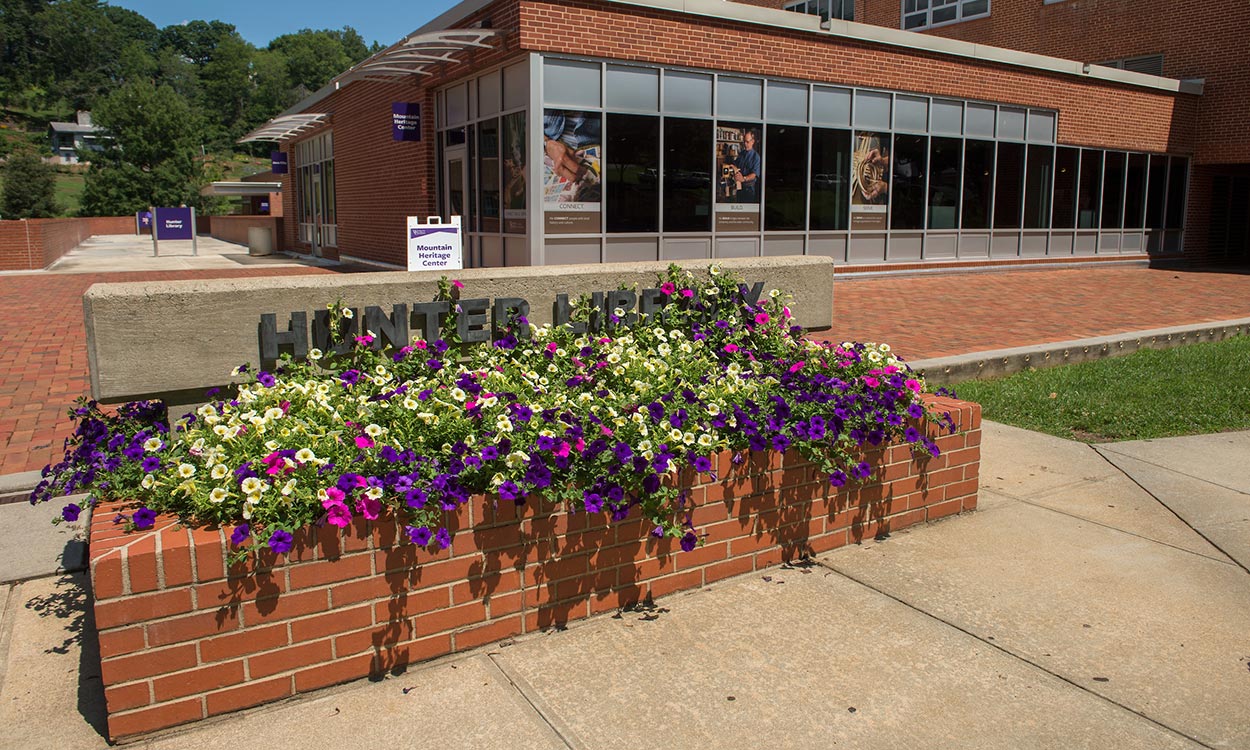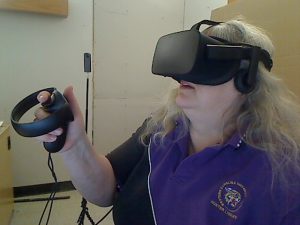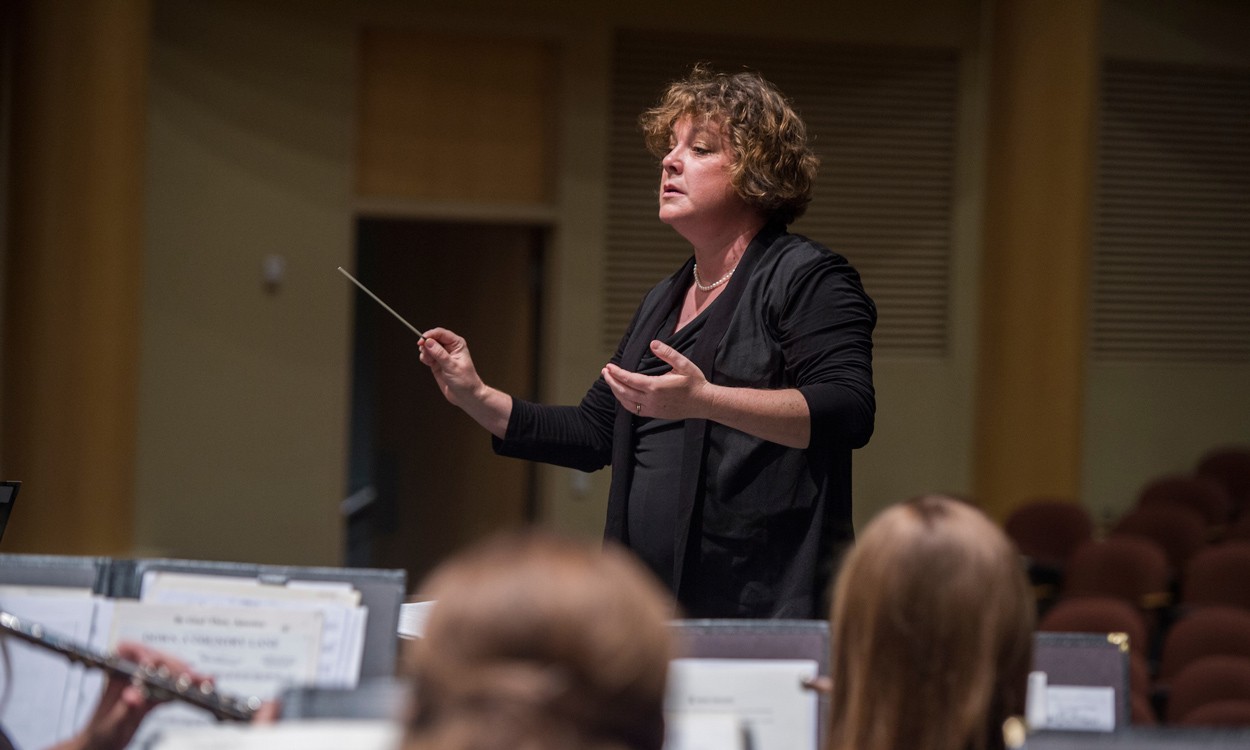Hunter Library continues to assist faculty, students with virtual research, including 3D anatomy
 When Ashley Hyatt, assistant professor of physical therapy at Western Carolina University,
recently needed to show her students various perspectives of the human brain, there
was a challenge.
When Ashley Hyatt, assistant professor of physical therapy at Western Carolina University,
recently needed to show her students various perspectives of the human brain, there
was a challenge.
Normally, Hyatt teaches from a classroom, in the laboratory and using clinical demonstrations. But in this case, she was faced with the new normal of COVID-19.
No problem. Enter the staff and resources of Hunter Library.
Jill Ellern, associate professor and IT systems librarian, had obtained Organon Virtual Reality anatomy atlas software earlier in the semester, just before spring break. "Students share video game play all the time with websites like Twitch," Ellern said. "Making on-demand videos of educational topics seemed like it would be a great service we could provide to the faculty and students.”
Following trial runs and discussion with faculty, Ellern and Hyatt were ready to put the application into use.
"Jill and I did a recorded Zoom session while she removed parts of the brain in virtual reality, so we could show the students a three-dimensional perspective of the basal ganglia," Hyatt said. "I did the voice-over while she did the step-by-step 'dissection,' so students were getting a good description of the parts from different angles, very much like they would with an anatomic model in the lab."

Jill Ellern enters the virtual realm.”
Although the Hunter Library building is closed to the public, the staff are still performing duties while practicing COVID-19 precautions, and are available to respond to many faculty and student requests for educational and research materials needs. The 3D example Hyatt and Ellern utilized fulfilled course requirements.
"Dr. Hyatt always goes above and beyond when it comes to educational experiences, but I was absolutely blown away when half-way through the lecture, a virtual reality clip of a simulation of the brain in a lab appeared," said Bianca Boieru, a first-year doctoral student in the physical therapy program. "With me being more of a visual learner, I highly valued our time in the anatomy lab. With our educational transition moving from face-to-face lecture to the online format, she found a way to give us back a piece of that experience. With something multi-layered and unique like the anatomy of the brain, the virtual reality simulation helped me visualize better than I could from any 2D textbook. I'm grateful for this type of technology that helps give students back the experience of being in the anatomy lab."
Another participating student readily agreed. "Being able to see such a complex structure, like the brain, in 3D has greatly contributed to my understanding of the location and orientation of structures within the cerebrum," said Abby Murrell, also a first-year doctoral student in the physical therapy program. "I feel very fortunate to have faculty and resources that optimize learning even from an online platform."
Physical therapy students must undergo a great deal of advanced instruction and experience with human anatomy in order to give their future patients the best possible care, said Ann Hallyburton, the library's liaison to the College of Health and Human Sciences.
"The use of virtual anatomy tools in remote physical therapy education will hopefully aid students and their professors in these interesting times when access to the laboratories and other hands-on experiences with anatomical study have been made so challenging," Hallyburton said. In addition to the interactive, illustrative model-based learning provided by the 3D Organon tool, Hunter Library has also temporarily made available to students the Acland’s Video Atlas of Human Anatomy, an electronic resource offering exploration of real human cadaver-focused anatomical instruction with a special emphasis on the mechanics of body movement, and McGraw-Hill Medical’s AccessPhysiotherapy, an electronic resource melding physical therapy electronic textbooks, videos and self-assessments.
"These tools join the library’s permanent access to Informa’s Anatomy.tv that offers interactive 3D models of human anatomy, numerous electronic research databases and journals, and the services of an experienced librarian who provides research assistance via Zoom, email, chat and telephone," Hallyburton said.
Hunter Library has always supported the early stages of the research lifecycle, said Sarah Steiner, associate professor and head of instruction services. "Whether selecting a topic, narrowing or broadening that topic, then finding, evaluating and synthesizing credible sources on that topic. With the Scholar Studio, we aim to close the loop on the research lifecycle by helping faculty and students to create multimedia research and scholarly projects."
The library also offers a mobile application that provides for easy access to online resources and services. In addition to providing a digital library card, the app allows users to check library hours, reserve study space, search databases, browse the catalog to request materials, and manage their account by reviewing due dates and renewing items. The app works for smartphones and tablets, and can be found under “WCU Hunter Library” through the App Store for iOS devices or Google Play for Android devices.
In addition to the VR anatomy lab and online platforms, the traditional book loan and checkout process remains available, with a staff member getting the physical item to a patron outside of the building.
"Hunter Library is one of the few libraries in the University of North Carolina System that did not cancel any of the services to students and faculty," said Farzaneh Razzaghi, dean of WCU library services. "Our dedicated staff and librarians answer questions through chat, email and phone, borrow materials from other libraries and, if a journal is available, scan the articles and email them to students and faculty. We also check online requests for physical materials that are included in our collection."
For information, visit library.wcu.edu.

